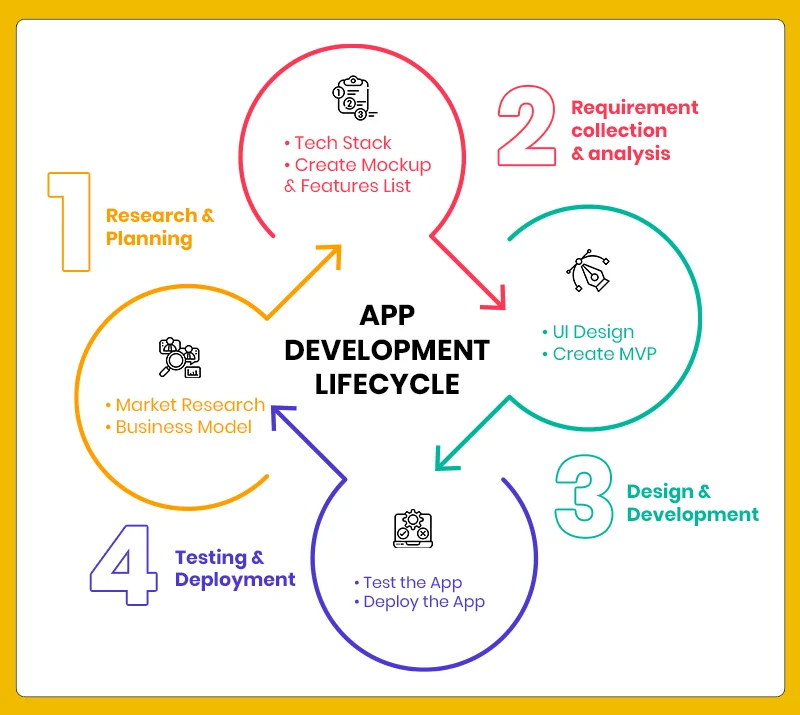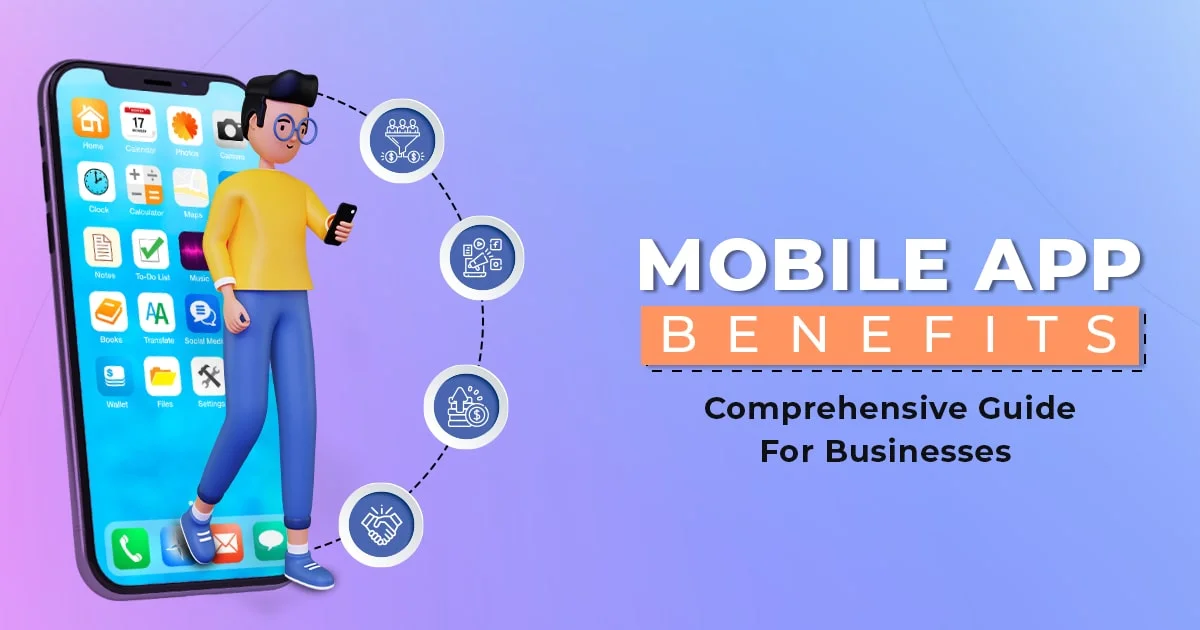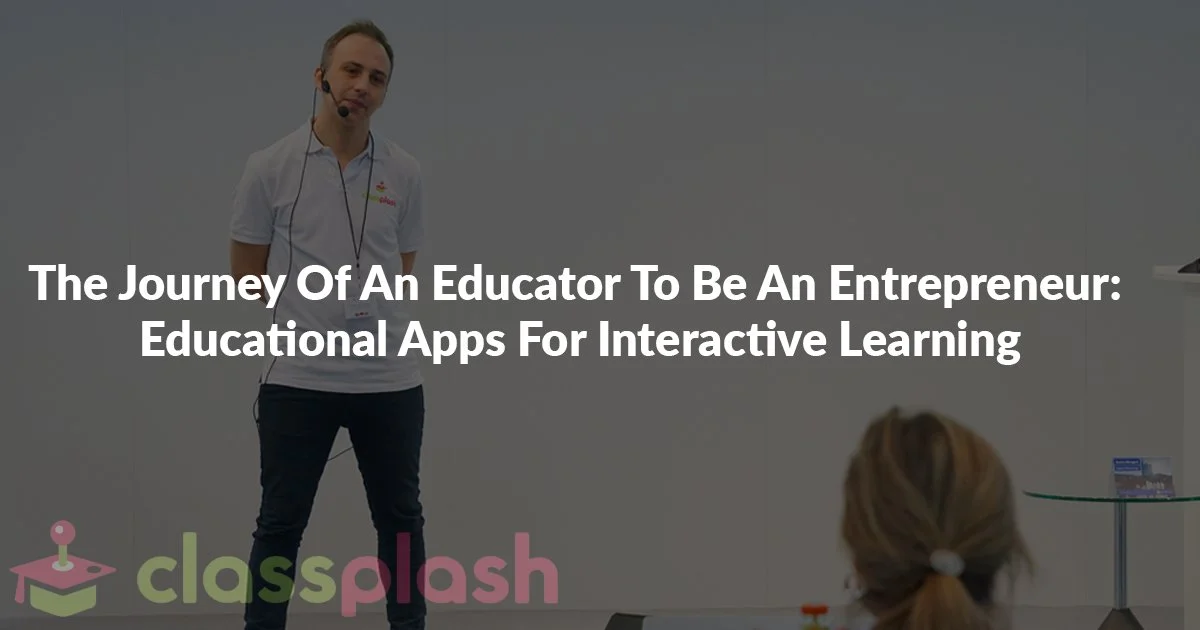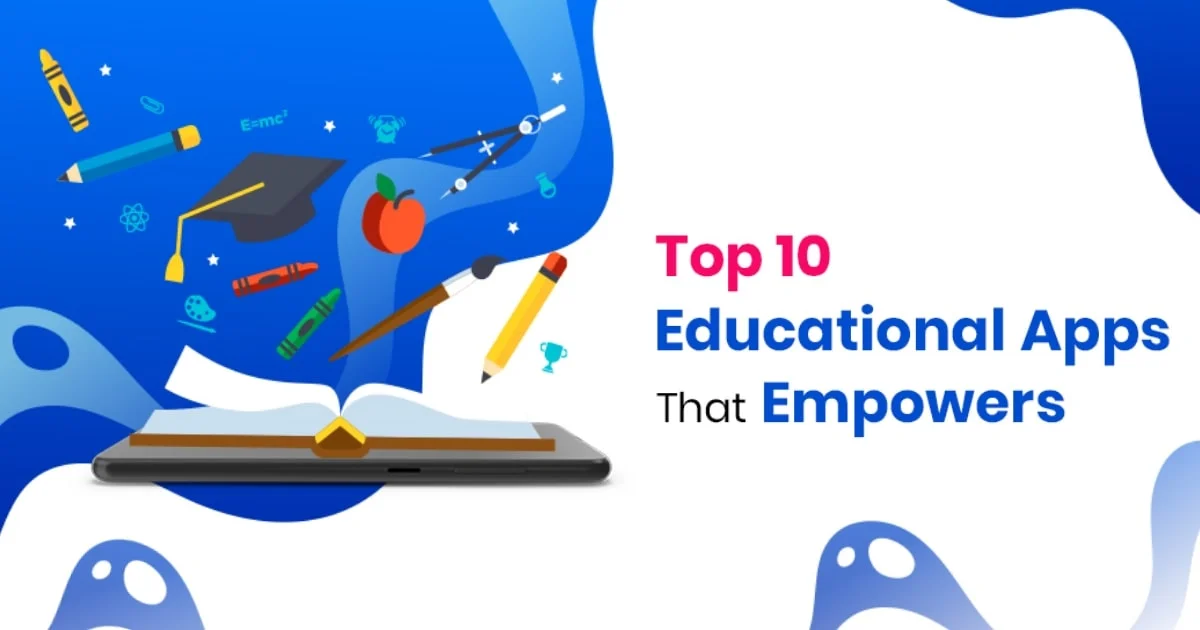Knowing the School Mobile Applications Types is crucial to understand how to make a learning app effectively.
The digital education sector is facing a pivotal moment. Students in the modern era of digitized education expect flexible learning options. However, educators find it challenging to keep students engaged when digitization takes centre stage.
There is a rising demand for effective educational technology, and entrepreneurs can capitalize on this demand. However, they face a significant challenge: understanding how to develop an educational app?
Whether you’re an edtech entrepreneur or an educational institution, creating an educational app or website requires a strategic approach that addresses the evolving challenges of,
Overcoming these challenges can be overwhelming. This article will help you overcome the challenges of creating an edtech app or website, including its benefits, trending apps, tech stack, and development steps. But first, you need to understand why you need an edtech application.
Why Are School Mobile Apps the Need of the Hour?
In the past, generations could only dream of using phones for education. But it’s fantastic to see how they have become a core part of the education system. What was once a luxury has become necessary in the evolving edtech space.
With school mobile apps, teachers and parents have so many resources at their fingertips! Smartphones have also significantly benefited students, as they don’t need to be physically present at schools to learn. This is a key benefit for students who live in remote areas.
While building an educational app does make a difference for students, what’s in it for you? Here are all the answers you need!
Why Should You Create an Educational App in 2026?
If you create an education app capitalizing on the market trends, your business can gain traction and earn more profits. The market is growing rapidly, and you can make the most of it by leveraging an expert educational app development company. Here are some market statistics to understand why you must create an academic application,
Cracking this market needs the value your educational app will provide the end customer. Understanding the benefits of mobile applications in schools and other academic institutions helps you gauge their value and strategize the development plan accordingly.
5 Benefits of Mobile Apps in Schools, Colleges & Universities
The benefits of an educational app go beyond the usual learning enhancements, ensuring better student engagement. Crucial benefits include,
1. Enhanced Learning Experience
The mobile app bridges the gap between theoretical and practical knowledge. With advanced features like AR/VR-based e-learning, interactive interface, and gamified learning, student engagement is higher than the conventional approach. It fosters student growth and improves learning capabilities by simplifying complex concepts.
2. Remote Learning
Students with accessibility issues who live in remote settings can access educational content through educational applications. These applications help students access the content, allow them to submit assignments and tests online, and track their academic growth.
3. Centralized Communication
The educational app will provide a centralized communication hub for parents, teachers, students, and academic institutes. It will reduce miscommunication and allow educators to announce significant updates to students and parents.
4. Personalized Learning Pathways
As an edtech startup, personalized learning is a key value you can offer. However, most startups struggle to build an educational app that offers customized learning pathways. One possible solution is the course customization feature, which allows students to personalize learning. You can make this feature more intelligent by integrating AI. It is one of the major trends in educational technology, helping students and educators fine-tune courses according to their learning capabilities.
5. Academic Performance Tracking
Educational applications allow students to track their academic performance, measure learning outcomes, focus capabilities, understand concepts, access test results from the app, and visualize data to help them understand their educational progress.
Knowing the benefits of creating an educational app, you now understand why it is worth your time and money. However, every project needs exemplary implementation, and this is where you can learn from market leaders who have already cracked the market.
5 Best Educational Apps Trending in 2026
Here are some of the most valuable apps for schools that are helping students, teachers, and parents.
1. Udemy
Udemy is an online educational app that acts as a marketplace for courses and materials created by individual teachers. Students can access different course materials and video tutorials across categories on the platform. It also allows the particular creators of the courses to add tests and evaluate students with the capability to offer certificates.
2. Duolingo
Duolingo is one of the leading language learning platforms, allowing students to speak several languages simultaneously. Students can use Duolingo to learn languages through a game-like approach with multiple exercises. It uses a gamification approach where students can play and learn.
3. Quizlet
Quizlet is a popular education app that allows users to create digital flashcards and study sets. It includes features like games and text-to-speech, with free and premium subscription options.
4. Epic
Epic offers an extensive library of children’s books, complete with reading quizzes and progress tracking for parents. A basic Epic app account allows you to read one book daily, while a premium subscription provides unlimited access.
5. Khan Academy Kids
Khan Academy for Kids is a free educational app designed for young learners. It features activities aligned with early learning standards. The app provides access to books, songs, and games to enhance learning for kids.
You can build different types of education apps based on the above applications. These apps can differ according to the use case and specific pain point of the students you are trying to help.
What Are The Types of School Mobile Applications?
Knowing the School Mobile Applications Types is crucial to understand how to make a learning app effectively. Understanding the types of educational apps you can build enables proper planning of features and development activities.
The list below categorizes the most popular educational mobile app development ideas for schools and colleges.
1. Core Learning Apps
Such apps offer foundational content in various subjects and use adaptive learning technologies to meet individual student needs. They combine traditional learning materials with multimedia elements, such as videos, quizzes, and interactive diagrams.
Educators can use these applications to assess students’ knowledge levels and adjust content, creating personalized pathways. It includes math apps with problem-solving exercises and science apps featuring interactive experiments.
2. Language Learning Apps
Language apps provide tools for enjoyable and effective language learning. Duolingo like app development offers organized vocabulary, grammar, and pronunciation lessons, often using game-like formats to promote engagement. They connect learners with native speakers or use AI for conversation simulations.
It helps students build confidence in real-life communication. These apps enhance vocabulary through enjoyable activities and flashcards that help retain information in the process of e-learning app development for language learning.
3. Kids Learning App
Apps in this category make learning fun for young children and foster foundational skills. Interactive applications teach letters and numbers through songs, animations, and games, making literacy and numeracy enjoyable. You can leverage app development for kids to create interactive and immersive learning experiences.
Digital storybooks with touchable animations and audio encourage kids to explore stories actively. These apps teach essential skills like colors, shapes, and basic ethics through playful activities. Games integrate learning with fun and teach skills from critical thinking to social interaction in a safe environment.
4. Parents Communication Apps
This app allows schools to communicate with parents about their students’ academic performance. Beyond academic performance, the app provides a platform for sharing information about extracurricular activities.
Schools can quickly notify parents about upcoming events, meetings, and opportunities for their children to participate in sports, arts, and clubs. This encourages student participation and fosters a sense of community within the school.
You can create an app where parents can search for new schools, teachers and academic institutions. An online education platform for parents that we built has features that allow teachers to search for the latest jobs and students to browse through several school options.
Apart from these apps, you can also create an education app like
These apps can offer value to students and parents through features that enable unique functionalities. Such functionalities can help them track academics, improve learning, and enhance educational performance. So, if you want to build an educational app, what features should you develop? Here is a list of features.
What Are The Must-Have Features in Creating An Educational App?
It is imperative to add specialized features that facilitate school admin, teachers, parents, and students to communicate real-time messaging and stay updated about the latest events.
Checklist for your school mobile app features: Understanding the common features of educational apps to build a functional and user-friendly solution.
The Tech Stack Required For Educational App Development
Developing an educational app involves a variety of technologies collectively known as a tech stack. Selecting the right stack is crucial for ensuring the app is robust, scalable, and user-friendly.
Here’s a breakdown of the essential components typically found in an educational app tech stack:
1. Frontend Development
2. Backend Development
3. Database Management
4. Cloud Services
5. Payment Processing
Integrating payment gateways like Stripe or PayPal for in-app purchases, subscriptions, or donations provides a secure transaction experience.
What are The E-Learning App Development Trends
From time to time, app development trends keep changing. This is because the entire development industry is evolving at a break-neck speed.
From our fact-based research, we bring to you six app development trends used to create an educational app. Let’s go!
Artificial Intelligence
The use of AI in education apps has increased with more technological innovation. In fact, the usage of AI for educational purposes among K12 students has risen from 37% to 75%. A chatbot is an excellent option for the same. A student user can ask questions while learning from the app.
Micro-Learning
Microlearning boosts the efficiency of students by 17%. Dividing the concepts into more minor subdivisions results in better understanding and an increase in the learner’s focus. This helps the student in absorbing the topic better.
More Videos for Interaction
This is no new fact that more colors and interactive content amplify the learning process. Moreover, considering the current scenario of the world, including webinars, video streaming, and conferences, helps a lot.
Trying a Game-based Approach
Most learners on such educational apps belong to the younger age groups. This means that there are more chances of attracting and gripping the users to the application. For an increased gamified experience, you can include progress bars, medals and trophies, and leaderboards.
Including AR with VR
Both virtual and augmented reality in education provides an immersive experience. Not only in creating an educational app, but these trends have made their place in the entire app development industry. The best part is that this trend brings great business and public-benefit possibilities.
This can be very fruitful for some education fields. For instance, medical students can perform medical work virtually supported by technology.
Personalized Approach
There are two things to take care of in the personalized approach. This also helps students in charting their course in their own time. Firstly, learners will be more interested if they are given the liberty to complete the course in their duration. Secondly, the names like – ‘Hi, John, resume learning from Chapter 2 Page 35’.
READ ALSO: The AI in Education Impact: Transforming Your Future Learnings ?
How to Build an Educational App?
If you’re wondering how to make an educational app, the strategy involves following a clear structured approach.
We’ve illustrated the App Development Lifecycle below breaking the process into four key stages:
Each stage illustrated above ensures your app is thoughtfully designed. To create a bug-free educational app or any product identify user needs and define key app features. By following these steps, you can successfully create an educational app.
3 Surefire Ways to Monetize Your Mobile App for Schools, Colleges & Universities
There are multiple ways to monetize an application and earn revenue from it. Here are three effective strategies for monetizing your education app to guide you better.
1. Subscription
Users can choose a plan that fits their needs and budget, whether it’s a long-term commitment or recurring payments made monthly or quarterly. This way, users only pay for what they want to learn, and you, as the app and service provider, earn from their subscriptions.
2. Advertisements
You can sign a contract to determine the percentage of income you want to earn from the advertisements displayed on your application. This is an effective way to earn some extra money.
3. In-app Purchases
The app owner receives a portion of the earnings whenever users purchase the app. This is a commission or platform fee that the app is entitled to receive.
The average cost of mobile app development for schools may range from USD 18k to USD 300k.
If you want a basic app, it costs you around USD 18k.
A complex app with additional features may cost you USD 100k-USD300k and more.
READ ALSO: How Much Does It Cost to Build an LMS (Learning Management System)?
How to Create an Educational App With Excellent Webworld?
The number of mobile apps for schools is increasing rapidly. These apps are becoming a link between students, teachers, and parents for optimal learning. Considering this new era of educational digitization, you may wonder how to create an educational app. We hope the above article has addressed everything you need to know about building an educational app.
However, if you want to reduce the hassle of building an educational app and focus on developing learning experiences, Excellent Webword can help. Our team of experienced educational app developers can create custom applications. Contact us now to learn more about our solutions.
Frequently Asked Questions – Build Educational Website & Apps
The development timeline to create an educational app varies based on factors like app complexity, features, and other requirements. Building a basic educational app with fundamental features can take 1-1.5 months. In contrast, more sophisticated apps with advanced features like AI-based personalized learning or live streaming capabilities may require more than 6 months. Developing for multiple platforms (iOS, Android, Web) and incorporating testing and quality assurance phases further extend the timeline.
Some of the most successful educational apps include Khan Academy, which offers free, world-class education with personalized learning features and trusted content across various subjects. Other examples include Udemy, Duolingo, and Quizlet.
To optimize the cost of creating an educational app, you can leverage an agile-based approach with a lean startup method. First, develop a mini version of your application, a minimum viable product (MVP). After MVP development, continuously build, test, and deploy newer versions to ensure lower costs.
There are three major engagement models that you can leverage to hire educational app development services. For example, you can choose dedicated teams that offer excellent educational applications that leverage the expertise of delivering robust apps. Further, you can also select a fixed scope or hire in-house developers. Outsourcing your project is more cost-effective and reliable compared to other models.

Article By
Paresh Sagar is the CEO of Excellent Webworld. He firmly believes in using technology to solve challenges. His dedication and attention to detail make him an expert in helping startups in different industries digitalize their businesses globally.




